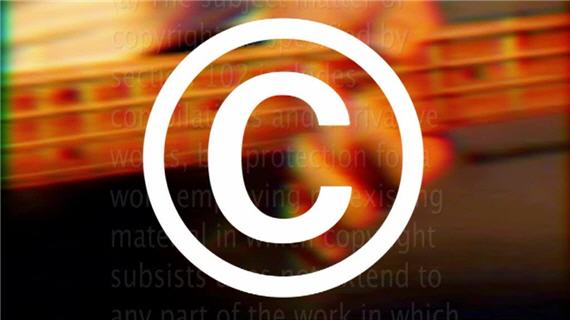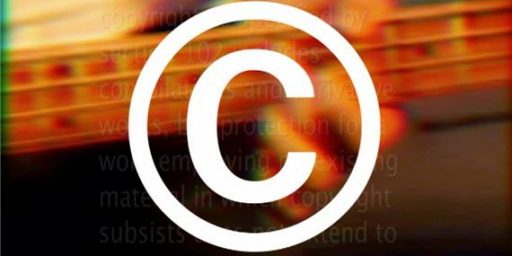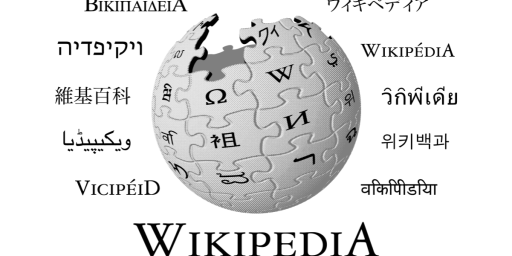RIAA Takedown Strategy Backfires
The recording industry has sent its 25 millionth Google takedown notice, trying to kill links that sprung up because of earlier takedown notices.
The recording industry has sent its 25 millionth Google takedown notice, trying to kill links that sprung up because of earlier takedown notices.
TorrentFreak (“RIAA Hits 25 Million Google Takedowns, Web Blocking Making Things Worse“):
A few moments ago Google processed the RIAA’s latest batch of copyright takedowns making the organization the music industry’s top sender of DMCA notices. Just ahead of the BPI, the RIAA has now removed more than 25 million URL listings from the world’s largest search engine. But with no clear end in sight, the boss of a UK-based anti-piracy company says the situation is actually getting worse, and it’s all thanks to website blocking.
Back in May the RIAA reached a historic milestone in its quest to remove copyright-infringing links from the Internet.
The music industry group asked Google to remove the 20 millionth URL from its indexes, doubling up on a similar number of requests already sent to underlying sites.
However, it now seems that either the RIAA are getting faster and better at sending notices, or the situation is somehow getting worse. It’s quite possibly a combination of the two.
After taking just over a year to send 20 million takedowns, just a few moments ago Google processed the RIAA’s 25 millionth URL takedown request. That means that in just six weeks the RIAA has achieved something that previously took it a quarter of a year.
Why is that, you ask?
At the time of the 20 million record, Brad Buckles, RIAA executive vice president of anti-piracy, described the situation in less than optimistic terms.
“Every day produces more results and there is no end in sight. We are using a bucket to deal with an ocean of illegal downloading,” Buckles complained. But is that because more and more content is flowing onto the Internet or are other forces at play?
Part of the problem for rightsholders sending notices to Google is that they are not actually removing any content, only links to it. Furthermore, while content is easily duplicated online, links to content are duplicated even more easily.
Interestingly, industry attempts to block file-sharing sites such as The Pirate Bay and KickAssTorrents appear to be the driving force behind an exponential increase in links that were once confined to these sites. Thanks to the dozens of proxy sites that have sprung up to facilitate access to blocked domains, the censored links are being duplicated dozens and dozens of times.
To put that into perspective, Pirate Bay currently reports 4.99 million torrents but you have to multiply that by the dozens of currently operational proxies in order to find the number of URL links now available.
So, essentially, the RIAA’s strategy has taken piracy from something confined to a handful of sites and spread it to a geometrically multiplying number of sites. One TorrentFreak commenter aptly described this as a “Hydra effect.”
It seems to me that RIAA is first and foremost abusing the DMCA takedown process. The right to hyperlink content online should be absolute; only illegal content itself should be targetable.
Beyond that, though, this just shows the futility of the industry’s anti-piracy approach. While I absolutely support copyright holders’ right to sell their own ware without competing against stolen versions of same, the industry was exceedingly slow to understand that sites like Napster created an expectation among music consumers of being able to download individual songs easily. Rather than trying to meet that demand, the industry tried to stifled it. The nature of the Internet made this next to impossible. Even now, some fifteen years in, it’s still essentially impossible to pay for individual songs. Even giant services like iTunes don’t have the catalogs of every artist because various record companies have refused to play or licensed their rights to a single distributor. The rights holders to The Beatles’ catalog, among many others, are notable holdouts. Rather than acceding to the RIAA’s wishes and dutifully purchasing entire CDs to own the one song they really wanted, consumers instead steal the songs out of frustration. That’s bad for all concerned, at least in the long run.







Buying a song or even buying an album is going to be a thing of the past, music streaming services like MOG, Rdio, and Spotify will be the future. Give the consumers access to (almost) all songs as long they pay and let them download DRM protected songs for off-line playing (as long as they are still paying the monthly fee). If the consumer is willing to pay $X each month for music, does it matter how much the consumer is consuming as long as $X is roughly what the average customer paid when they were still buying music?
@PJ:
If those services allowed downloading, I’d be all over it. Unfortunately, while Spotify is still streaming only, it’s useless to me. The only time I listen to music is either in my car on my phone (where I don’t have unlimited data), or at work (where they block almost all streaming media).
@PJ: @Ben: I’m a subscriber to MOG, which not only lets me stream music even while driving (and play through my car’s speakers) but also download the songs to my iPhone and/or iPad for under $10 a month. But none of these services has anything like a complete collection of everything ever. Even incredibly mainstream bands like The Beatles, Rolling Stones, Bob Seger, and AC/DC are either absent or have only a small portion of their catalogs available.
i use kickass torrents to record tv shows that i miss, it’s been knocked off a couple of times but comes right back. the amount of newly released movies and such on there is astounding..
the one place they don’t seem to realize that does this is youtube, you can download songs there with a converter.
@Ben:
Spotify allows you to store 3,333 songs on your device for off-line listening.
@James Joyner:
With time that will change, there were bands that resisted against digital purchases too, and I’m pretty certain some bands really didn’t like the CD.
AC/DC just recently put it’s music on iTunes, and Metallica is finally on Spotify, so things change…
@PJ: But probably too late. Fifteen years—the amount of time since Napster came on the scene—is an epoch in Internet time. And the fragmentation of offerings simply isn’t going to be acceptable. Listeners simply expect to be able to download (or stream) any song they can think of from any platform they happen to like. Even iTunes isn’t of any use to those without an Apple device and Spotify is hardly for everyone.
The RAIAA was stuck with the law it had, which didn’t imagine an Internet or a YouTube at the time the laws were framed.
I think in the end copyright holders are jhust going to stop creating altogether, at which time consumers are going to wonder why there is no good music or art being made anymore.
It’s the lesson of the passenger pigeon-there was an endless supply of them and it was fun shooting all you could-until the day there were no more.
@James Joyner:
If users want to download any song they can think of from any platform they happen to like, then Spotify/etc is the thing. There’s nothing out there with the ease and size of those services.
Unless by download, you mean to get a DRM-free copy for free.
Sure, one of the bigger music torrent sites will get you the newest and the most popular songs, but the catalog will be a lot thinner. And if you have an acquired taste, then you’ll have to look around a lot more.
@PJ: I’m thinking of something along the lines of the MOG model but with a better catalog: All the songs you want for a flat fee of, say, $10-15 a month. Even that’s steep to a lot of people but it’s comparable to what I was spending as a high school and college student on albums, so strikes me as reasonable.
@stonetools:
That won’t happen. Just because someone has a copyright on a work doesn’t mean that work is necessarily valuable.
What’s happening here is that, thanks to various technological innovations, the value of individual recordings of music has plummeted. It’s alright. It’s not the first time the music business experienced technological disruption.
It’s not like Tin Pan Alley is still making healthy profits selling sheet music anymore…..
@James Joyner:
Bingo.
Piracy is driven by scarcity. As long as those bands choose to hold out, they are doing more to promote piracy than anyone else.
However, at least for the moment, the stakeholders still feel they have more to economically gain from maintaining the status quo scarcity model. And chances are, even with piracy, they are probably right. Of course part of the reason for this is that all the music in question was paid for decades ago. None of these bands really need to market their music.
@James Joyner:
I’d say that’s what I’ve been arguing 🙂
So, I agree.
@PJ: Gotcha. I’m just saying we’re a long way from that reality at present. It’s the only direction that makes sense but that was obvious in the days of Napster and AudioGalaxy.
@stonetools: HAHAHAHAHA.. HAHAHAHAHAHAHAHA
There’s absolutely no way your post can be serious.
Consumers have been wondering that since the dawn of time. What you fear is already here and it’s thanks to the big labels not the pirates. The big labels are the ones pushing the no talent hacks on us. Meanwhile the true artists are being pushed off the racks because the big labels are demanding the retailers make room for Brittany v 3.1..
Fortunately the power of a free internet has allowed me to connect with some real talented musicians online. That same power has allowed me to directly finance those musicians that I consider worthwhile. That’s a major win for real artists because if they signed with a big label to make it “big” they’d probably still be poor. Very few musicians actually come out of a contract with a big record label in a positive manner. The record labels do everything they can to maximize profit while minimizing payout to the actual creators of the content. Accounting in the music industry is very much like hollywood accounting (for example Forest Gump never made profit according to hollywood)
This link is just as relevant today as it was 13 years ago.
http://www.salon.com/2000/06/14/love_7/
As for me I’m no longer much of a pirate as I can’t really stand MP3s. I won’t settle for anything less then a good FLAC copy but I much prefer the original files.
Also I’m tired of the loudness war which record labels are promoting..
@matt: your right, there’s so many talented people/groups out there that it’s impossible to find them w/o things like; dish radio, youtube, facebook, alternative radio stations, etc- the big record companies hate this but they seem to have lost the battle. back in the 70’s bands toured to promote albums and ticket prices were nominal- they weren’t trying to rape us on the show as they wanted the album sales. these days bands need to tour to make money, it’s a good thing. i won’t pay $100 to see some dino bands either- they should retire after 50 or so. just my $.02.
@bill:
which is about what the artists make on these services if they are lucky.
@slimslowslider: Which is better then they usually make off CD sales…
@matt: It really depends on their deal, Matt. I personally know independent artists who have made a nice profit on their CDs and vinyl sales, but still waiting for their 2 cents (from a 99 cent download!) from the various streaming services. David Lowery from Camper Van Beethoven has dozens of posts about the current state of payment from streaming services on his blog. It is a sad state of affairs for the artist.
@slimslowslider:
I said “usually” not “every single artist that is and isn’t signed to a major label”…
They of course are in reference to not “independent artists” as I’ve been referring to bands who signed with one of the major labels.
@matt: Gotcha, sorry about that. That said, the guy form CVB was on a major. I was replying to a specific comment, not your entire thread. Again, my apologies.
@slimslowslider: Yeah as independent you trade one set of inconveniences for another.
I’m glad the bands you know are making a nice profit on CD sales. That’s heartening news in this modern world.
I’m not sure if you’re saying you know someone on a major label or not. Could you clarify this comment?
@matt:
Yeah, I mean, no one is getting rich of course, but at least they are getting some compensation, but at the same time, they def trade off some of the perks of a major.
David Lowery from Camper Van Beethoven was on a major label and had a pretty big hit with his other band Cracker in the 90s. He posts lots of stuff about the lack of $$ from streaming services that I have found illuminating. I just wish it was easier for artists to get paid for their art, and I am sure we agree on that. Thanks for the discussion.
@slimslowslider: I’ll check that out thank you.